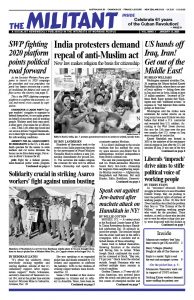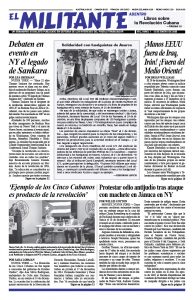January 16, 1995
BOSTON — Less than seven hours after an antiabortion gunman walked into two Boston-area clinics December 30 and shot seven people, killing two clinic workers, more than 500 people turned out in front of one of the medical facilities to protest the killings and defend a woman’s right to choose.
The next day 2,000 demonstrated at the state Capitol to denounce antiabortion terrorism and demand the government provide protection at abortion clinics. More than 1,000 people participated in a January 3 memorial service for the two women murdered in the attacks.
Activists in the fight to defend abortion rights are calling for protests and encouraging wide participation in an “Action for Reproductive Freedom” called by the National Organization for women in Boston January 22, the anniversary of the Roe v. Wade Supreme Court decision legalizing abortion.
January 16, 1970
A federal district court has denied GIs the constitutional right of freedom of assembly in a ruling on a civil-liberties suit arising out of the Fort Jackson Eight case. But the decision opens the path for further appeals in higher courts.
Chief Judge Donald Russell of the U.S. District Court in South Carolina denied that soldiers at Ft. Jackson have the right to hold an open meeting on post to discuss the war and related issues.
His decision was in response to a suit which grew out of the harassment and imprisonment of eight leaders of GIs United Against the War in Vietnam at the South Carolina base last spring. The day following an informal meeting at which many GIs spoke out against the war, eight leaders were arrested; three of them served 61 days imprisonment in the base stockade. They were released when their case received nationwide attention.
January 13, 1945
Following on the heels of a national campaign to whip up sentiment for labor conscription, Roosevelt submitted his annual message to the new Congress demanding immediate enactment of forced labor legislation. Roosevelt’s lengthy message can be boiled down to the following specific proposals: (1) a National Service Act to be adopted “at the earliest possible moment”; (2) immediate legislation providing for the conscription of those now classified as 4-F; (3) universal peacetime military training for American youth; and (4) amendment of the Selective Service Act “to provide for the induction of nurses into the armed forces.”
These measures are intended to supplement Roosevelt’s job-freeze decrees, to place practically the whole working population under the control of a military caste, Prussianize American life and to straitjacket the labor movement.

